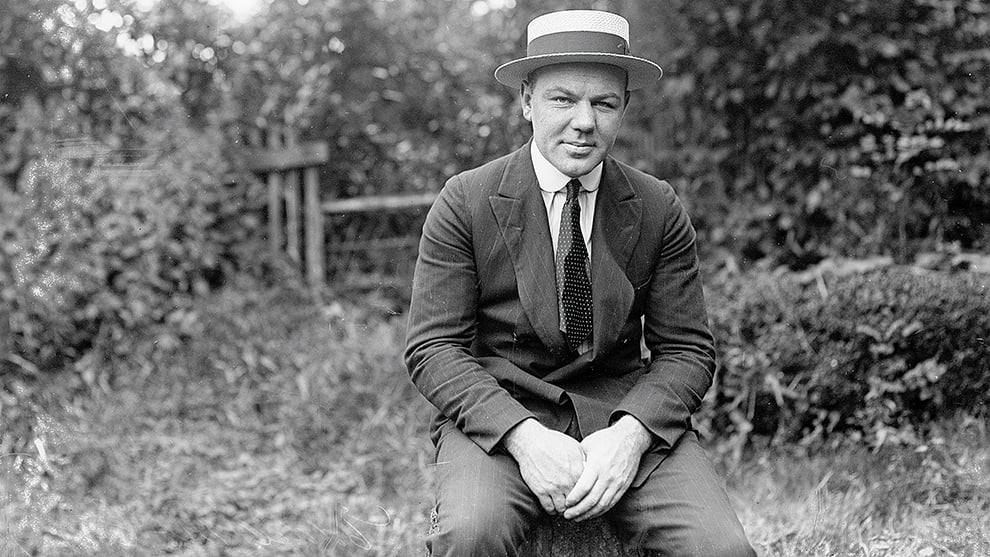By Miles Templeton
ONE THING that boxing has plenty of is characters. Promoters, trainers and managers are frequently larger than life, with the boxers often more so. One such character was Eddie McGoorty of Oshkosh, Wisconsin. Eddie would fight anyone, anywhere and he barnstormed his way around the world in doing so. The Australians even recognized him as World middleweight champion.
I have selected him for this column because of his interesting record against British fighters, both over here and in the States, and because of the caliber of the men that he fought against in a 20-year career that ended in 1922.
His most famous opponent is, undoubtedly, the great Harry Greb. The two clashed in 1918, with McGoorty coming out on the wrong end of a 10-round decision. Greb seems to have acquired an almost mythical status these days among boxing fans, many of whom are contextually young. In an age when little regard is given to great boxers of the past, Greb seems to have transcended this bias, with many referring to him as the greatest boxer that ever lived. This cannot be proven because there is no footage of the great man in the ring, which I find remarkable.
McGoorty first crossed the Atlantic in 1909, when he beat Nutty Curran in a 20-round contest in Dublin. He remained in Ireland for four months, winning four of his five contests there. His only loss came against Tom Lancaster of Spennymoor, a real hard nut who claimed the Pitmen’s middleweight championship in 1909 by virtue of a 10th round win over Tom Stokes of Mexborough. Stokes was thrown out for butting, but this didn’t bother Lancaster, who was as tough as they came. Victory over McGoorty was, undoubtedly, Tom’s finest victory in a 56-bout career with only nine losses.
McGoorty recorded three more wins in England and then, in 1912, be flattened Jack Harrison, the British middleweight champion, in one round at Madison Square Garden.
In 1918, McGoorty represented the United States in the Victory tournament that took place at the Royal Albert Hall. This event was held to celebrate the Allied victory in the First World War, and men from all over the Commonwealth and the United States took part, including Harry Greb. McGoorty lost out to eventual winner, Bombardier Billy Wells, in the heavyweight semi-final.
Throughout 1919 and 1920 McGoorty boxed many times in the UK meeting most of our leading heavies and light-heavies. Among those he defeated were Tom Gummer, Harry Reeve and Bandsman Rice. He was then matched to fight Joe Beckett, the British heavyweight champion, in a 20-round contest at Olympia. A week or so before the contest McGoorty was to be found “drunk and incapable” in Tottenham Court Road, for which he was fined 10 shillings at Bow Street magistrates court. Realizing that he had upset the promoter, Charles B Cochran, and that interest in the contest might have been affected by his behavior, McGoorty tried to make amends by telling the press: “I must have been the victim of the heat wave. I knew that I was not drunk. I pleaded guilty in the court because I wanted to escape publicity, but I was unlucky. Don’t be alarmed Mr Cochran I shall be fit to fight the fight of my life against Beckett.”
McGoorty put in a decent performance against Beckett, going down in the 17th round of a hard-fought duel. Among many other great fighters that McGoorty clashed with in a career that commenced in 1902 were George Chip, Battling Levinsky, Mike Gibbons, Les Darcy, Jeff Smith, Frank Klaus and Jack Dillon. His final fight in the UK took place at Windsor Conservative Club, of all places, when he stopped Jack Stanley in three rounds.
He died in 1929, aged 40, from a throat ailment. He was a hard-living, hard-fighting scrapper of Irish descent, the like of which is rarely seen in American rings today.
